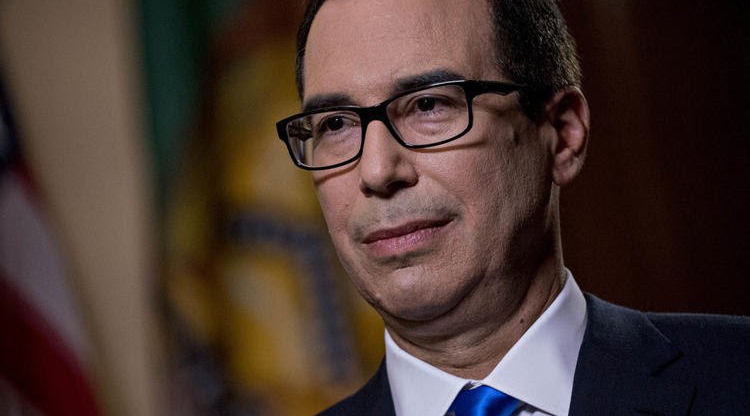US Treasury Secretary Steven Mnuchin Tries Calm Banks, Panicked Stock Markets, Trump Completely Silent (#GotBitcoin?)

A bruising stock selloff continued Monday, knocking major U.S. indexes lower as Treasury Secretary Steven Mnuchin tried to instill calm into a jittery market. US Treasury Secretary Steven Mnuchin Tries Calm Banks, Panicked Stock Markets, Trump Completely Silent
Coming off the stock market’s worst week since the 2008 financial crisis, the Dow Jones Industrial Average, S&P 500 and Nasdaq Composite fell further Monday as investors continued to confront rising interest rates, slowing U.S. growth, and the ramifications of a government shutdown extending into January.
The Dow industrials fell 223 points, or 1%, to 22239 shortly after the opening bell, while the S&P 500 slipped 0.9%.
The Nasdaq Composite also fell, shedding 0.7%, after closing more than 20% below its recent high to enter bear-market territory on Friday.
With the selloff showing little signs of slowing, Mr. Mnuchin attempted to reassure investors, saying he had spoken individually with the chief executives of six large banks to ensure they had sufficient lending capacity.
The bank bosses “confirmed that they have ample liquidity available for lending to consumer, business markets, and other market operations,” according a Treasury Department statement published Sunday on Twitter.
The banks “have not experienced any clearance or margin issues” and “the markets continue to function properly,” the statement said.
But Mr. Mnuchin’s efforts to soothe investors may have had the opposite effect, analysts said, with banks stocks falling along with most other assets Monday.
Shares of Bank of America fell 1.5% in early trading, while Citigroup declined 1.4%. Goldman Sachs and Morgan Stanley notched more modest declines.
The ongoing fall in oil prices also hurt stocks Monday. Crude oil prices slumped more than 1% to $45 a barrel, extending the commodity’s decline in recent months. Simultaneously, shares of energy companies fell 1.3%.
Bank shares fell overseas too, pulling the Stoxx Europe 600 down 0.5%.
Top-level departures from the Trump administration, geopolitical tensions and concerns around growth have left investors skittish.
Congress and the president—at loggerheads over the funding of a wall along the U.S.-Mexico border—failed to reach a budget agreement last week, leading to the shutting down of large chunks of the federal government.
The 10-year U.S. Treasury yield dipped to 2.770% from 2.792% Friday. Yields move inversely to prices.
Some investors remain bullish about growth in the U.S. continuing next year, pointing to positive economic data, even though the Federal Reserve ignored Mr. Trump’s calls for easy monetary policy and raised rates last week.
“People are struggling to look past the immediate actions of the Fed,” said Robin Creswell, managing principal at Payden & Rygel Investment Management.
“For those who can take a longer view and for those who are less focused on their day-to-day balance-sheet needs or their regulatory capital needs, the underlying position is not much changed,” he added.
As the holiday period approaches, analysts expect thin volumes in the final days of 2018 and are watching closely for surprise events that could stoke volatility.
Top of mind for many are the continuing trade tensions between the U.S. and China. Markets have been thrown by comments by President Trump on Twitter since the president sat down with his Chinese counterpart in Argentina a few weeks ago.
Larry Lau, portfolio manager at asset management firm Trium Capital, says comments from the U.S. that suggest Beijing is making concessions to avoid further tariffs work in favor of Chinese officials.
“What they realize is that the ‘slowly, slowly’ approach works very well,” said Mr. Lau. “What they don’t want is the rest of the world ganging up on them.”
Related Article:
Trump Policies Cause Chinese Stocks To Out-perform Those of US. (#GotBitcoin?)
Go back
Leave a Reply
You must be logged in to post a comment.